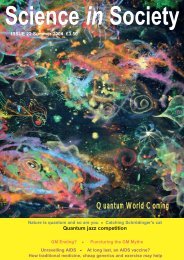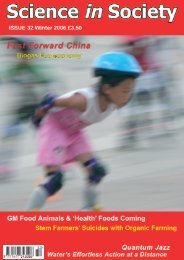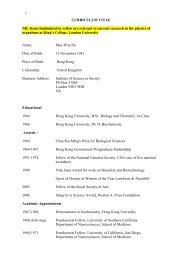Ethiopia goes organic to feed herself - The Institute of Science In ...
Ethiopia goes organic to feed herself - The Institute of Science In ...
Ethiopia goes organic to feed herself - The Institute of Science In ...
You also want an ePaper? Increase the reach of your titles
YUMPU automatically turns print PDFs into web optimized ePapers that Google loves.
29<br />
creas and lung <strong>of</strong> cows.<br />
Recombinant aprotinin produced<br />
in plants is currently marketed.<br />
Bill Freese <strong>of</strong> Friends <strong>of</strong> the Earth<br />
reviewed the problem <strong>of</strong> allergy<br />
and pancreatic disease associated<br />
with this product.<br />
Aprotinin is also listed as a<br />
reproductive hazard. <strong>The</strong>re is<br />
serious danger <strong>to</strong> those exposed<br />
<strong>to</strong> aprotinin after having had a<br />
previous exposure. For example,<br />
a two-year old child suffered<br />
severe anaphylactic shock (a lifethreatening<br />
allergic reaction characterized<br />
by swelling <strong>of</strong> body tissues<br />
including the throat, difficulty<br />
in breathing, and a sudden fall<br />
in blood pressure) after a test<br />
dose <strong>of</strong> aprotinin. Fatal anaphylaxis<br />
followed aprotinin exposure<br />
in a local application <strong>of</strong> fibrin<br />
glue. A similar application led <strong>to</strong><br />
an immediate skin reaction following<br />
re-exposure <strong>to</strong> fibrin sealant.<br />
Secret field testing <strong>of</strong> plantbased<br />
recombinant aprotinin<br />
could result in severe or fatal anaphylaxis,<br />
either in a brief exposure<br />
in the maize field <strong>of</strong> someone<br />
previously treated during surgery,<br />
or exposure <strong>of</strong> someone<br />
exposed <strong>to</strong> the maize field followed<br />
by treatment during surgery.<br />
<strong>The</strong> final commercial recombinant<br />
protein in maize is beta-glucuronidiase<br />
(GUS). <strong>The</strong> gene is<br />
used in a wide range <strong>of</strong> experimental<br />
situations but does not<br />
appear <strong>to</strong> have therapeutic importance.<br />
It has been observed that<br />
formula milk for infants had a low<br />
content <strong>of</strong> GUS while mother's<br />
milk had elevated GUS.<br />
Elevated GUS has been implicated<br />
in bilirubinaemia (jaundice)<br />
<strong>of</strong> breast-fed infants and breastfed<br />
infants <strong>of</strong> diabetic mothers.<br />
GUS is used extensively as a<br />
marker, believed <strong>to</strong> have little<br />
effect on the phenotype <strong>of</strong> the test<br />
organism. However, GUS was<br />
found <strong>to</strong> enhance the <strong>feed</strong>ing<br />
activity in the peach aphid, suggesting<br />
that the marker may not<br />
be entirely without effect on the<br />
organism.<br />
<strong>In</strong> conclusion, the secretive<br />
production <strong>of</strong> dangerous pharmaceuticals<br />
in food crops is a truly<br />
disturbing development. <strong>The</strong> sale<br />
<strong>of</strong> such products without transparent<br />
public approval is adding<br />
insult on injury, reinforcing the<br />
public perception that the regula<strong>to</strong>ry<br />
authorities are putting corporate<br />
pr<strong>of</strong>it far above public safety.<br />
SiS<br />
Ban Plant-based Transgenic<br />
Pharmaceuticals<br />
Pr<strong>of</strong>. Joe Cummins and Dr. Mae-Wan Ho call for a global forum and a<br />
ban on testing pharm crops, especially in Third World countries<br />
As one after another biotech giant<br />
retreated from genetically modified (GM)<br />
crops for food and <strong>feed</strong> in Europe (see<br />
"Biotech investment busy going<br />
nowhere", this issue), the industry is<br />
redoubling its efforts <strong>to</strong> develop plantbased<br />
transgenic pharmaceuticals in<br />
North America and elsewhere.<br />
<strong>In</strong> April 2004, California stalled a<br />
major attempt <strong>to</strong> introduce GM rice producing<br />
human lac<strong>to</strong>ferrin and lyzozyme<br />
in<strong>to</strong> 10 counties, but efforts <strong>to</strong> use rice<br />
and other food crops <strong>to</strong> produce hazardous<br />
pharmaceuticals have continued<br />
unabated.<br />
On 12 July, the European Union<br />
(EU) announced the award <strong>of</strong> 12 million<br />
euros <strong>to</strong> a network <strong>of</strong> labora<strong>to</strong>ries in 11<br />
European countries plus South Africa <strong>to</strong><br />
explore the possibilities <strong>of</strong> producing<br />
pharmaceuticals grown in genetically<br />
modified plants. <strong>The</strong> consortium,<br />
"Pharma-Planta", will use plants <strong>to</strong> produce<br />
vaccines and treatments against<br />
major diseases including AIDS, rabies,<br />
diabetes and TB. Human trials <strong>of</strong> the<br />
drugs are <strong>to</strong> begin within the next five<br />
years. <strong>The</strong> project is co-ordinated in the<br />
UK by Pr<strong>of</strong>. Julian Ma <strong>of</strong> St. George's<br />
Medical School London; and John <strong>In</strong>nes<br />
Centre, UK's <strong>to</strong>p GM crop research institute<br />
is also a member <strong>of</strong> the consortium.<br />
A day later, it was revealed that<br />
South Africa, the only member <strong>of</strong> the<br />
consortium outside Europe, is <strong>to</strong> be the<br />
test site <strong>of</strong> the first pharm crops. South<br />
Africa's Council for Scientific and<br />
<strong>In</strong>dustrial Research is particularly interested<br />
in potential vaccines against HIV.<br />
Philip Dale, plant technologist at John<br />
<strong>In</strong>nes Centre in Norwich and the project's<br />
biosafety co-ordina<strong>to</strong>r, reportedly<br />
said that the cost <strong>of</strong> 24-hour surveillance<br />
<strong>of</strong> GM fields in the UK has made it<br />
expensive <strong>to</strong> conduct similar trials in<br />
Britain.<br />
<strong>The</strong> use <strong>of</strong> Third World countries for<br />
testing and producing plant-based pharmaceuticals<br />
unacceptable both in<br />
Europe and the United States smacks <strong>of</strong><br />
colonialism. It also raises the spectre <strong>of</strong><br />
unmoni<strong>to</strong>red and unregulated human<br />
exposures <strong>to</strong> the dangerous products.<br />
This problem will be exacerbated as<br />
opposition <strong>to</strong> pharm crops is growing in<br />
the United States, and more Third World<br />
countries will be targeted for test sites<br />
and production facilities. ISIS has<br />
played a key role in exposing the marketing<br />
<strong>of</strong> pharm crop products in the<br />
United States previously unbeknownst<br />
<strong>to</strong> the public, via a gaping loophole in<br />
the US regula<strong>to</strong>ry system (see "Pharm<br />
crop products in US market", this issue).<br />
A coalition <strong>of</strong> consumer and environmental<br />
organizations in the US issued a<br />
call for a mora<strong>to</strong>rium on genetically engineered<br />
pharm crops on 21 July. <strong>The</strong>y<br />
want the California state agencies <strong>to</strong><br />
conduct a rigorous investigation <strong>of</strong> the<br />
potential hazards posed by a biotech<br />
company's plan <strong>to</strong> produce pharmaceutical<br />
drugs from genetically engineered<br />
rice.<br />
<strong>The</strong>re is an urgent need for proper<br />
international regulation on the testing<br />
and production <strong>of</strong> plant-based pharmaceuticals.<br />
<strong>The</strong> first step may be a wider<br />
discussion <strong>of</strong> the drawbacks and dangers<br />
<strong>of</strong> plant-based pharmaceuticals as<br />
well as the "advantages" put forward by<br />
proponents in academe and corporations.<br />
<strong>The</strong> overlooked dangers <strong>of</strong> pharm<br />
crops include pharmaceuticals that are<br />
<strong>to</strong>xic, that could produce immune sensitization<br />
followed by anaphylaxis, or oral<br />
<strong>to</strong>lerance leading <strong>to</strong> loss <strong>of</strong> immunity <strong>to</strong><br />
pathogens; and general loss <strong>of</strong> confidence<br />
in the food supply. <strong>The</strong>se have<br />
been discussed in numerous reviews<br />
from the <strong><strong>In</strong>stitute</strong> <strong>of</strong> <strong>Science</strong> in Society.<br />
<strong>The</strong> United Nations Food and<br />
Agriculture Organization (FAO) has run<br />
a number <strong>of</strong> electronic conferences<br />
around "Agricultural Biotechnology for<br />
Developing Countries - an Electronic<br />
Forum". <strong>The</strong>se moderated discussions<br />
have been quite productive. It is time <strong>to</strong><br />
have an electronic forum on "Plantbased<br />
Pharmaceuticals in Developing<br />
Countries".<br />
Do contact the administra<strong>to</strong>r <strong>of</strong> the<br />
FAO project Dr. John Ruane, at biotechadmin@fao.org<br />
<strong>to</strong> call for such a forum<br />
as a matter <strong>of</strong> urgency. <strong>The</strong> FAO forums<br />
are described at the following URL:<br />
http://www.fao.org/DOCREP/004/Y2729<br />
E/Y2729E00.HTM<br />
It is important that the testing and<br />
production <strong>of</strong> plant-based pharmaceuticals<br />
in the Third World are made public<br />
before they are quietly and extensively<br />
carried out without the informed consent<br />
<strong>of</strong> those directly affected.<br />
Meanwhile, it is imperative <strong>to</strong> impose<br />
a ban on field test releases and biopharmaceutical<br />
production by multinational<br />
corporations and foundations, especially<br />
in Third World countries.<br />
SiS<br />
www.i-sis.org.uk











